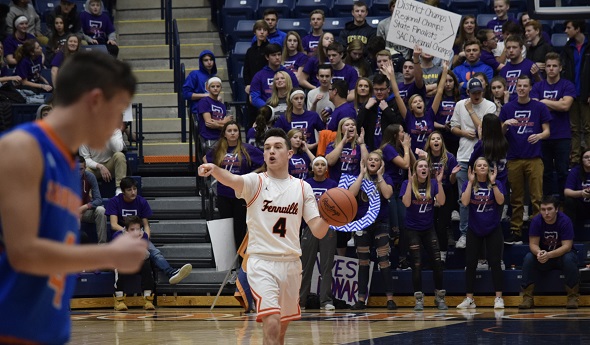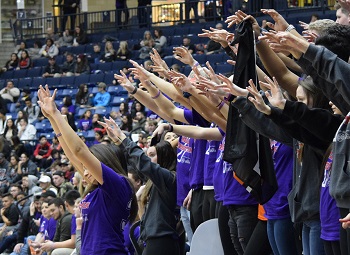
Detroit 'Longtime' Boys Coaches Down to Few
By
Tom Markowski
Special for Second Half
December 14, 2016
Gary Fralick considers himself one of the fortunate ones.
 Fralick, 66, is in his 32nd season as a head boys basketball coach. He retired from his teaching position in 2013. He started coaching at Redford Thurston in 1979, went to Royal Oak Kimball in 1984 and is in 23rd season as the head coach at Troy.
Fralick, 66, is in his 32nd season as a head boys basketball coach. He retired from his teaching position in 2013. He started coaching at Redford Thurston in 1979, went to Royal Oak Kimball in 1984 and is in 23rd season as the head coach at Troy.
Fralick might be lucky, but he is unquestionably rare. Fralick is believed to be one of three coaches in the Macomb/Oakland/Wayne area who has coached for more than 30 seasons.
There’s Dan Fife at Clarkston and Kevin Voss of Clinton Township Chippewa Valley, both of whom in their 35th seasons, all at the same school.
Another, Greg Esler at Warren DeLaSalle, is in his 30th season. He was the head coach at St. Clair Shores Lake Shore for seven seasons before going to DeLaSalle in 1994.
“We’re part of a dying breed,” Voss said.
It certainly appears so. Coaching longevity has taken on a different meaning recently. Twenty seems like a lot in these times, and in reality it is a long time. Twenty years or so ago, 20 years was normal. There’s a new normal, and 20 or 25 years isn’t it.
Many factors have contributed to this change. A person’s personal and family life often don’t coincide with the demands of coaching basketball. The responsibilities that come with coaching have increased. Some coaches say that to be an effective coach, it can be a 10- or 11-month job.
Two factors are at the forefront, and they are both financial. Coaches used to be educators as well as coaches. Yes, coaching can be viewed as teaching on the court, but at one time teaching in a classroom and coaching used to go hand in hand.
 Then there’s the subsidy coaches receive. It varies from school district to school district. Some make $4,000 a season, others can make $7,000. And it also costs money to run a program; unless the coach receives financial help from a booster club or parents, the money he or she receives begins to dwindle.
Then there’s the subsidy coaches receive. It varies from school district to school district. Some make $4,000 a season, others can make $7,000. And it also costs money to run a program; unless the coach receives financial help from a booster club or parents, the money he or she receives begins to dwindle.
But the most important factor is time.
“A tremendous amount of time is devoted to watching DVD or tapes,” Fralick said. “I know I’m dating myself with saying that. The point is, you’re watching a lot. There’s more scouting. And you don’t get paid much. Why don’t they stay as long as they used to? They get burned out. They want to spend more time with their families.
“You don’t see as many of the young coaches stay. Coaches don’t have the ambition to coach a long time. It’s not a profitable job. I don’t know what other coaches make. We used to compare what we made. Not anymore.
“Thirty years or more? I don’t see it happening. There’s the dual job thing. Things have changed. To me, it’s been a great job.”
To compensate for being away from home, Fralick brought his family with him. Sort of. He coached his son Gary, Jr., and Tim. Gary, a 1996 Troy graduate, played for his father his junior and senior seasons and Tim, a 1999 graduate, played four seasons on varsity. Fralick said he was even more fortunate to coach both on the same team (during the 1995-96 season).
Then there’s his wife, Sharon, who remains the scorekeeper.
“I’ve always had a passion for coaching and teaching,” Fralick said. “I love the game of basketball. I love the kids. There’s never a dull moment. It’s been a great ride.”
Vito Jordan has been around basketball all of his life. His father, Venias Jordan, was the boys head varsity coach at Detroit Mackenzie and Detroit Mumford before stepping down as a head coach only to return to the bench assisting his son the last six seasons.
Vito Jordan, 31, became a head coach at Detroit Osborn when he was 24. He started his coaching career the year before as an assistant to Henry Washington at Macomb College. Jordan went to Detroit Community after one season at Osborn and guided Community to its only MHSAA Finals appearance (Class B, 2013). He’s now in his fourth season as the head coach at Detroit Renaissance.
“I followed my father all of my life,” Jordan said. “I knew what I wanted to do when I was in college (Alma College). This is what I want to do the rest of my life.”
It’s different in Detroit. Schools close. Job titles change. Jordan, for instance, teaches at the Academy of Warren, a middle school in Detroit. It’s a charter school, not within the Detroit Public School system, therefore he receives his pay from two separate school systems (Renaissance is in the DPS).
There is a distinction. In some school systems coaches will receive a percentage – let’s say for argument sake, 10 percent – of their teaching salary to coach. Let’s say a person makes $60,000 a year to teach. He or she would then receive $6,000 to coach. If you coach two sports, that’s $12,000.
 Jordan is not privy to such a contract. Each job is separate. Jordan loves to coach, and he understands he must be a teacher to earn a decent living, and he’s content to continue on the path he is following. But he also knows that to make a good salary just coaching one must move on to the collegiate level like others have done.
Jordan is not privy to such a contract. Each job is separate. Jordan loves to coach, and he understands he must be a teacher to earn a decent living, and he’s content to continue on the path he is following. But he also knows that to make a good salary just coaching one must move on to the collegiate level like others have done.
“When there were coaches like my dad, Perry Watson (Detroit Southwestern), Johnny Goston (Detroit Pershing) and others, they all worked in the (Detroit Public) school system. Everyone was teaching. That was your career. None of them had aspirations of being a college coach. Not even Watson. Now everyone isn’t in the teaching profession. Maybe they do have a degree and maybe they don’t. The point is, most aren’t teachers. I can count on one hand those (in Detroit) who have their teaching certificate and coach.”
Jordan noted such successful PSL coaches like Derrick McDowell, Steve Hall and Robert Murphy who left high school to pursue a coaching career in college. Murphy guided Detroit Crockett to the Class B title in 2001 and is now the head coach at Eastern Michigan. McDowell has had two stints as a collegiate assistant coach, most recently at EMU. He’s since returned to coach at Detroit Western. Hall coached Detroit Rogers to three consecutive Class D titles (2003-05) before going to Duquesne University and Youngstown State as an assistant coach. Hall returned to Detroit last season and is in his second season as head coach at Detroit Cass Tech.
Jordan said they left high school to challenge themselves professionally, among other considerations. Voss said there are variables that influence how long a person lasts, in one school district or in coaching in general, that didn’t exist 20 years ago.
“Athletics have become pervasive in high school,” he said. “The whole booster situation you find in college is here. You can be winning but not winning enough. It’s a trickle down affect.
“Coaches complain about parents. Parents complain about playing time. High school sports is not as pure as it once was. Winning is way more important now. Now a coach comes in with a three-year window. You can have one or two down years, and the third you’d better win.
“Then there’s the pressure on your family. I’ve been lucky. My wife and I have had the players over for team dinners. We create a family atmosphere. It’s a change of society. I don’t envy the young coaches coming in.”
Community involvement has always been a priority for Voss. To keep a hand on the pulse, Voss heads the elementary basketball program within the Chippewa Valley school district. Games are held on Saturdays, and approximately 750 students take part.
“You have to have the right fit,” he said. “I’m in the right spot. You coach for different reasons when you get older. I’m enjoying the game. There’s a different level of satisfaction.”
 Tom Markowski is a columnist and directs website coverage for the State Champs! Sports Network. He previously covered primarily high school sports for the The Detroit News from 1984-2014, focusing on the Detroit area and contributing to statewide coverage of football and basketball. Contact him at [email protected] with story ideas for Oakland, Macomb and Wayne counties.
Tom Markowski is a columnist and directs website coverage for the State Champs! Sports Network. He previously covered primarily high school sports for the The Detroit News from 1984-2014, focusing on the Detroit area and contributing to statewide coverage of football and basketball. Contact him at [email protected] with story ideas for Oakland, Macomb and Wayne counties.
PHOTOS: (Top) Troy boys basketball coach Gary Fralick, left, is in his 32nd season coaching. (Middle) Detroit Renaissance boys coach Vito Jordan is following in the coaching footsteps of his father, Venias. (Below) Chippewa Valley boys coach Kevin Voss, left, is in his 35th season at his school. (Top and below photos courtesy of C&G Newspapers; middle photo courtesy of Detroit Public School League.)

Rivals Unite for 'Never Forgotten Games'
January 24, 2018
By Dean Holzwarth
Special for Second Half
FENNVILLE – The small West Michigan towns of Fennville and Saugatuck are separated by less than 10 miles, thus sparking a longstanding rivalry that has played out in various sports through the years.
 However, for one night, a special event brought the two communities together to help support a worthy cause.
However, for one night, a special event brought the two communities together to help support a worthy cause.
The seventh-annual “Never Forgotten Games” between the neighboring communities were played Friday night at Hope College in honor of Wes Leonard, who died unexpectedly in 2011 after making the game-winning basket in overtime against rival Bridgman.
Leonard, a 16-year-old junior at the time, died from sudden cardiac arrest due to an enlarged heart.
To open the night, Saugatuck’s girls defeated Fennville 55-40. Then, in a back-and-forth affair typical of a rivalry game, Fennville’s boys edged Saugatuck 48-46 and improved to 8-2 on the season.
But Fennville boys basketball coach Joe Rodriguez said the final result paled in comparison to the impact the game had on both schools.
“We circle that game on the calendar because it’s an opportunity to focus your energy on something bigger than us,” he said. “It’s not just a conference game; it’s not just another basketball game or Friday night game. It’s bigger than the game of basketball itself. It’s one of our former players that we look forward to tributing.
“Everyone was there for one reason, and that was to celebrate the legacy of Wes Leonard and to support the cause.”
The two schools joined forces to help make the night a success, including meeting in the days prior to discuss game preparations.
“Some Fennville kids came over to our school and met with some of our kids before to go over cheer and signs and just how we could help out,” Saugatuck boys basketball coach Andy Diaz said. “Our kids showed up early to help set up and help Jocelyn (Leonard, Wes' mother), so it was a real collaborative effort.”
This year Fennville’s student section, recalling some of their experiences taking part in the MHSAA’s “Battle of the Fans” the last two years, invited Saugatuck’s student section to join forces for some cheers during the game. Last week, Fennville student section leaders Kamryn Vandyke, Clay Rosema and Isabella Marquez strategized with Saugatuck’s Reece Schreckengust, Sydney Ayres and Alexa Phillips, designing and planning cheers they could do together.
The schools’ band teachers – Fennville’s Paul Andrews and Saugatuck’s Andrew Holtz – also met and planned the combined bad that played together in the same section for the entirety of Friday’s game.
“Although rival schools, both student bodies have embraced the idea that the cause is an opportunity to be a part of something greater than the game itself,” Fennville athletic director Frank Marietta said. “Both schools are very competitive on the field of play, but there is a positive and strong relationship between the students as a whole. The spirit and heart of the students from each school is what makes it such a great rivalry.”
 The close-knit ties between the schools run deep.
The close-knit ties between the schools run deep.
“They know each other very well,” Diaz said. “They work at the same places during the summer, and they cross paths all the time. I have a lot of friends in Fennville.”
Rivalry games often are intense and emotional, but this one is different due to the greater significance the night holds.
“That’s the unique part of it,” Rodriguez said. “As a coach you want to talk about how it’s your rivalry game, but this one is a little different. It’s all about the events, and they play a big part in helping.”
“They are our neighbors, and when we went through (Leonard’s death) they showed a lot of support as a community to Fennville, and I think it’s awesome that they are a part of this game as well.”
Rodriguez said competing against another team in that setting just wouldn’t seem fitting.
“Because we are so close it would be weird if it was another community that we were playing,” he said. “It would feel manufactured, where this is more genuine.”
Diaz said the rivalry took on a different meaning after Leonard’s untimely passing.
“I feel very fortunate to be a part of the best small-school rivalry in the state of Michigan,” he said. “That’s our personal opinion, and when Wes passed, it definitely changed the perspective and narrative of the rivalry, especially on that game night.”
Shortly after Leonard’s tragic death, The Wes Leonard Heart Team was formed. The foundation raises money for automated external defibrillator (AED) awareness and donates AEDs to schools throughout the state.
The mission of the foundation is to honor Wes’s life using a team approach, combining the efforts of his loved ones and other existing foundations in the pursuit of a common goal. The foundation “is committed to honoring the children who have lost their lives to Sudden Cardiac Arrest and preventing other families and friends from feeling the pain of losing their loved ones. With this team approach, we feel we can give others a chance at ‘just one more game.’”
More than 260 AEDs have been put into schools through the foundation, and another 4-6 will be donated with money raised Friday.
The Never Forgotten Game hits close to home for Diaz, whose mother survived a scare almost seven years ago.
“My mom was saved by an AED,” Diaz said. “She had a heart attack in church, and one was used to revive her. They had to shock her twice, and without an AED, she’d be gone.”
Diaz, a Saugatuck graduate who coached against Leonard in football and basketball, hopes the money raised by the game can help others who may encounter the same situation.
“I gave my mom a big hug before that game because an AED saved her life, and maybe this game buys the right AED for a school that saves someone else’s life,” Diaz said. “It just put things into perspective. Obviously, we always want to win the game, but at the end of the day what really matters is the cause and Wes.
“We talked before the game about how this game is bigger than any of them. It’s not about us; it’s not about them. It’s about the entire state of Michigan at this point because of the importance of saving lives.”
 Dean Holzwarth covered primarily high school sports for the Grand Rapids Press and MLive for 16 years and more recently served as sports editor of the Ionia Sentinel and as a sports photojournalist for WZZM. Contact him at [email protected] with story ideas for Allegan, Kent and Ottawa counties.
Dean Holzwarth covered primarily high school sports for the Grand Rapids Press and MLive for 16 years and more recently served as sports editor of the Ionia Sentinel and as a sports photojournalist for WZZM. Contact him at [email protected] with story ideas for Allegan, Kent and Ottawa counties.
PHOTOS: (Top) Fennville's students cheer as a classmate brings the ball upcourt against Saugatuck on Friday. (Middle) Fennville's student section worked with Saugatuck's to cheer together during the games at Hope College. (Photos by Isabela Marquez/Fennville High School.)

